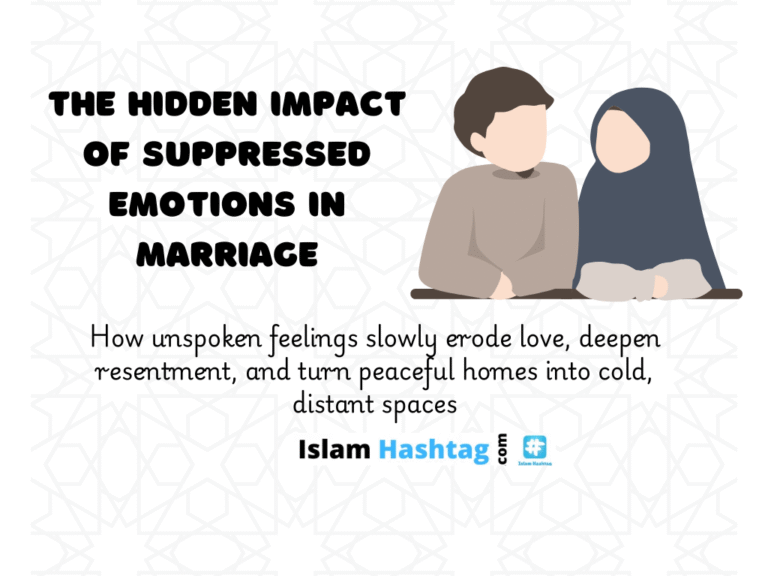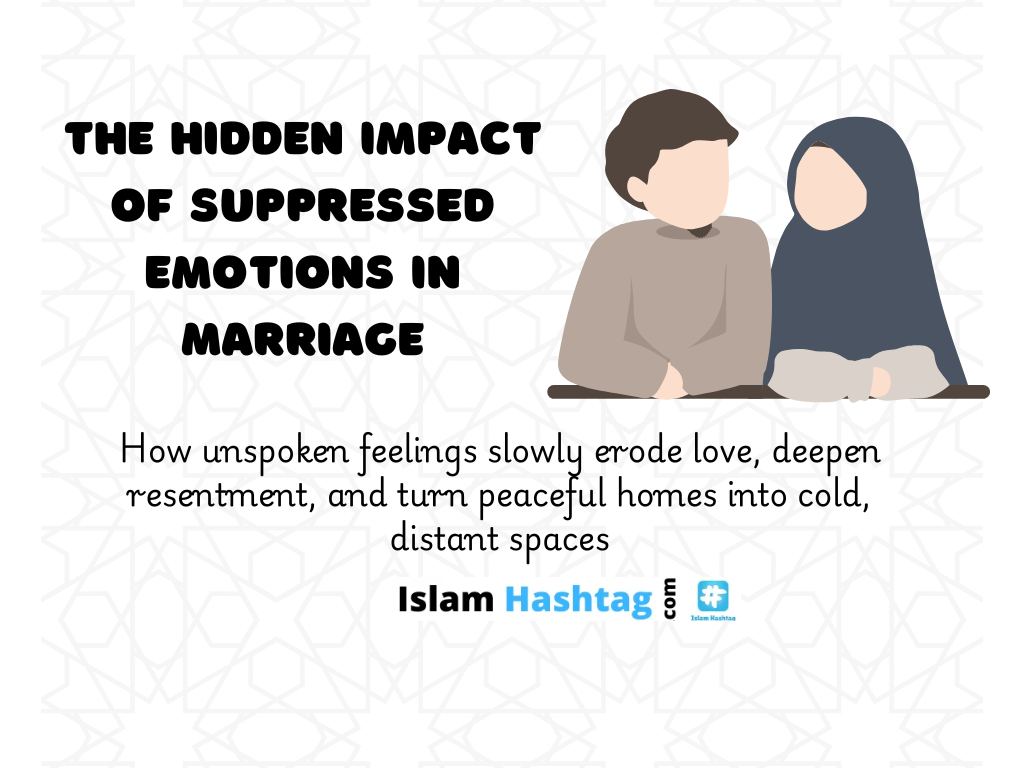Couples therapy: The Hidden Impact of Suppressed Emotions in Marriage
How unspoken feelings slowly erode love, deepen resentment, and turn peaceful homes into cold, distant spaces?
In many families, relationships remain shallow—not because love is absent, but because emotions are never expressed. When we lack the courage or skill to affirm ourselves or speak our feelings, our closest relationships suffer. This is especially true in marriage.
Also Read : Finding a Righteous wife

The Four Dangerous Stages of Suppressed Emotions in Marriage
Let’s reflect on something that author John Gray mentioned in his book “What You Feel, You Can Heal.” He speaks of four warning signs that a person is walking down the wrong path in any deep relationship—not just with a spouse, but with anyone emotionally close. These four stages gradually lead to emotional distance and pain if not addressed.
John Gray, in his book “What You Feel, You Can Heal,” outlines four stages that often appear in emotionally strained relationships:
- Resistance – Silently enduring discomfort
- Resentment – Growing irritation and unspoken anger
- Rejection – Avoiding interaction and expressing frustration
- Suppression – Emotional numbness and quiet surrender
The first sign is resistance. It happens when a person has unspoken complaints or discomforts. For example, a woman may admire her husband’s character—he’s kind, generous, respectful—but she feels suffocated because he never leaves the house. She wants to visit her family and friends, but feels guilty leaving him behind. She prepares everything for him before going, but still feels heavy-hearted. When asked why she doesn’t tell him, she says, “He’s so good to me. I can’t say something like that.”
This is resistance—a silent internal battle. Her intentions are sincere, but the result is emotional burden. Soon, she finds herself disliking his constant presence. She begins to feel emotionally exhausted, though she still sees him as a good man.
This leads to the second stage: resentment. Without realizing it, the person becomes easily irritated. Their words become sharp and clipped, even over trivial matters. “Okay, fine.” “What do you want now?” The other partner doesn’t understand what’s going on, because nothing was ever said. The resentment builds internally and starts to affect tone, attitude, and behavior.
The third stage is rejection. The person begins to avoid interaction. They may express anger openly now—”Just leave me alone,” “I’m tired of this.” The partner feels accused, confused, and sometimes fights back, leading to arguments.
The fourth and most dangerous stage is emotional suppression. This is when one partner gives up trying. They no longer argue. They choose peace over truth. They say, “Let me stay quiet. At least there will be no fight.” But peace without love is emptiness. Many homes survive in silence—not in love.
The painful part is that this kind of emotional suppression kills the relationship slowly. One spouse may begin to obey, not out of love, but to avoid complaints. The home becomes a place of emotional tension. It is no longer a space of joy, but of silent compromise.
What’s the root of the problem? The inability to express what one feels. If you keep doing something your spouse dislikes, and they never tell you, how will you know? You may think you’re doing right, while unknowingly causing pain.
Even the Prophet Muhammad ﷺ made clear his likes and dislikes. Books have been written about what he loved and what he disliked—because healthy relationships are built on knowing one another. If your spouse dislikes being teased, don’t tease. If they value punctuality, don’t be late. These small acts, when known and respected, create a safe emotional space.
But if you don’t even know what your partner loves or hates—how can you make them feel loved? The home becomes cold. The heart feels empty. And the relationship slowly fades into duty, not devotion.
So speak. Say what you feel with kindness. Tell them what hurts and what heals. What you feel can be healed—but only if it’s shared. Silence might seem polite, but in the long run, it’s the loudest destroyer of love.
Unspoken Pain Turns Love into Loneliness
Sometimes, the pain of not being heard is greater than the pain of being hurt. A person may feel invisible—not because they aren’t loved, but because their emotional world goes unnoticed. You can live in the same house, eat at the same table, and still feel deeply alone.
This is what happens when silence replaces communication. When someone feels they can’t speak, they also begin to believe they don’t matter. The more they bottle up, the more the heart tightens. And one day, without any explosion, the heart just… shuts down.
Good Intentions Don’t Always Lead to Good Outcomes
Many people think, “I won’t say anything because I don’t want to hurt them.” But what if that silence causes more harm than the words ever could? What if your unspoken feelings are quietly reshaping the relationship—causing distance, frustration, and eventually, emotional detachment?
Intentions matter, yes. But intentions alone don’t build love. Love must be shown, heard, and shared. The truth is: a gentle, honest word said today can save years of hurt tomorrow.
Don’t Wait Until It’s Too Late
By the time most couples seek help, they’ve already drifted far apart. The damage wasn’t caused by one big argument—but by years of walking on eggshells, avoiding difficult conversations, and choosing comfort over connection.
It doesn’t have to get that far. You don’t need to wait until you “can’t take it anymore.” You can begin now—with one simple sentence: “Can I share something that’s been on my heart?”
That one sentence could open a door that’s been locked for years.
The Heart Needs to Be Known, Not Just Tolerated
A peaceful relationship isn’t built on pretending everything is fine. It’s built on vulnerability—on the ability to be fully seen, and still loved. When someone listens to your pain, respects your needs, and adjusts with love, that’s when a marriage deepens.
You don’t want a spouse who simply tolerates your presence. You want a companion who understands your soul. That kind of closeness doesn’t come from silence—it comes from sharing, from listening, and from growing together.
There Is Still Time to Heal
If you feel you’ve been quiet for too long, know this: it’s never too late to begin. Healing doesn’t require perfection. It only requires courage. You don’t have to say everything at once. Just start.
Start by being honest—with yourself first, then with them. Tell them what brings you joy. Tell them what hurts. Tell them what you need. And most importantly, create space for them to do the same.
A Marriage Rooted in Emotional Honesty Is a Gift
When both spouses feel safe to speak and safe to listen, a beautiful rhythm develops. Mistakes are forgiven more easily. Frustrations are met with empathy. The home becomes a source of warmth, not weight.
And isn’t that what we all want? A home where you can breathe, speak, cry, laugh—and be held through it all?
Final Thoughts: Speak Before Silence Becomes the Language of Your Relationship
Don’t let the fear of conflict keep you from emotional connection. Don’t let politeness cost you your closeness. The most loving thing you can do—for yourself and your spouse—is to be emotionally present.
You deserve a love that hears you. You deserve a relationship that heals. And you can have it, in shā’ Allāh—if you’re willing to replace silence with sincere, kind, and courageous words.
Join us for FREE Tafsir Class for Women
Related
Discover more from Islam Hashtag
Subscribe to get the latest posts sent to your email.
